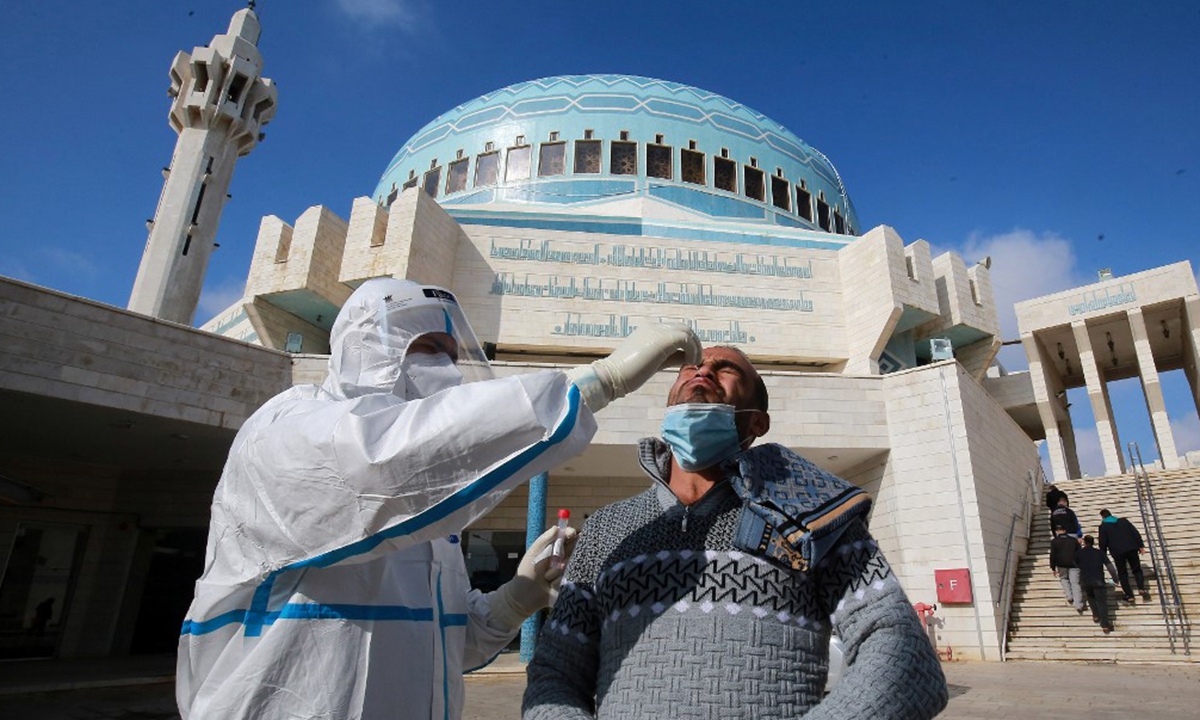
A member of the Jordanian health ministry's epidemiological investigation team takes a random nasal swab to test for COVID-19 from a man leaving the King Abdullah I mosque following the Friday noon prayers, in the capital Amman, on December 18. Photo: AFP
Instead of posters showing a wide variety of activities to celebrate the new year, warning signs decorated the exteriors of cafes and hotels throughout Amman's downtown streets.
Roaming on the streets, one would also notice that the once crowded cafes and restaurants were currently shut down, while the survivors eagerly provided consumers extra promotions during the festivals, which still brings no significant cheer to them.
By the end of 2020, the COVID-19 crisis claimed more than 3,800 lives in Jordan and hammered the kingdom's economy, which trapped the tourism and hospitality business at an "all-time low" while leaving the public hoping for a speedy recovery next year.
"The year 2020 is certainly a very tough year. The hospitality sector endured a big hit due to the coronavirus pandemic... The closure of cafes, restaurants, and hotels shows the large impact of the economic downturn," Abdul Hakeem Hindi, chairman of Jordan Hotels Association's Board of Directors told Xinhua.
According to Hindi, since the outbreaks of the pandemic, occupancy rates in the Dead Sea hotels have dropped to around 10 percent on average, and to zero in the rose-red city of Petra.
"International traveling were dramatically declined... Many entertainment facilities inside hotels, such as swimming pools and spas, were also banned to protect the citizen's health, but it affected the business hugely," Hindi added.
Although the New Year holidays were approaching, the country's tourist attractions, namely Petra, Aqaba, Wadi Rum, and the Dead Sea, witnessed low hotel reservations with celebrations canceled and few tourists coming.
Samir Hason, an employee at a hotel in Aqaba, said they had no reservations for New Year's Eve compared with 50-60 percent occupancy in the previous same period.
"This challenging situation is not only happened to us, but even the five-star hotels are also suffering," he told Xinhua.
Tourism and related industries play a vital role in Jordan's economy, contributing almost 20 percent of its GDP in 2019, some $8.8 billion, accompanied by 5.36 million tourists visiting Jordan in 2019 and employing over 50,000 people, according to official figures.
The current tourism and hospitality business indicated the magnitude of the economic setbacks under the pandemic, Jordanian economist Wajdi Makhamreh said.
"Lost of facilities went out of business and employees lost their jobs. Thus we have to reach a balance between curb of the spread of the virus and economic recovery," Jordanian economist Wajdi Makhamreh said.




